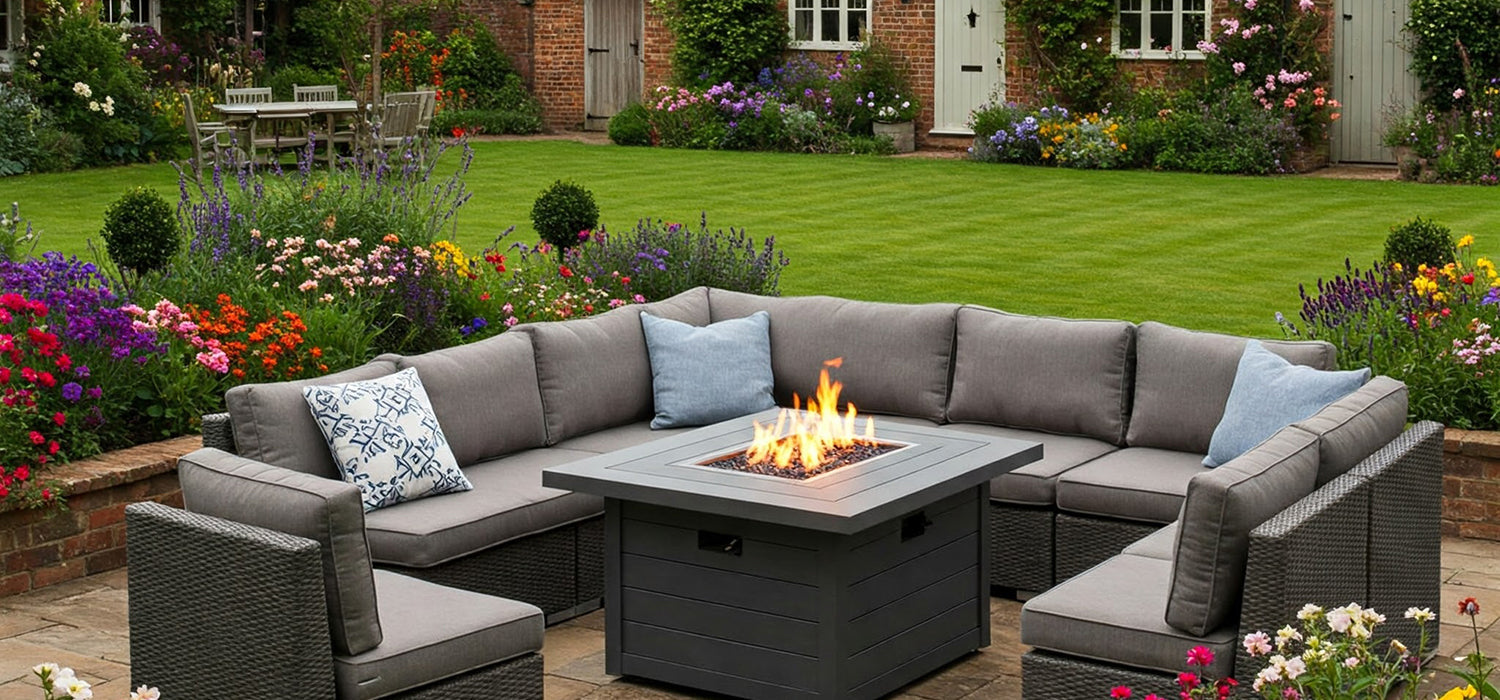
Why Is My Gas Fire Pit Not Lighting? Here’s How to Fix It Fast
Tired of your gas fire pit—or fire table—not lighting up? The short answer: it’s probably a gas flow issue, a faulty igniter, or something blocking the flame. But don’t worry! Keep reading for easy fixes and tips to get your fire pit blazing again in no time!
Common Causes of Lighting Issues
Gas Supply Problems:
Empty Propane Tank or No Natural Gas Supply
The most common issue behind a fire pit not lighting is a problem with the gas supply. It sounds obvious, but it’s easy to overlook! If you're using propane, check if the tank is empty. For natural gas, ensure the main valve is open and there are no kinks in the line. Double-checking this could save you a lot of frustration.
Regulator Problems
Another sneaky culprit is the regulator. If it's blocked, frozen, or malfunctioning, it can stop gas from flowing properly to the burner. Even if you have gas in your tank, a faulty regulator can prevent the fire from lighting. If you suspect an issue here, take a look and see if there are any visible blockages or signs of freezing.
Ignition System Issues:
Faulty Igniter or Wiring
It’s all well and good having gas, but without the ignition system working, you’re out of luck. If your igniter isn’t clicking, it could be a sign the battery is dead, the wiring is faulty, or the igniter is broken. Test the igniter by pressing the button and listening for a click. If there’s no sound, the igniter might need replacing or the battery could be flat.
Dirty or Corroded Components
We’ve all experienced the frustration of a faulty lighter due to dirt or rust, and your fire pit’s ignition system isn’t much different. Over time, dirt, debris, and corrosion can build up on the igniter components. Give them a good clean with a cloth or wire brush to make sure they’re sparking properly. Trust us, this simple step often solves more issues than you'd think!
Burner Problems:
Clogged Burner Ports
Clogged burner ports are another common problem. Debris, soot, and even water can get trapped in the burner, blocking the gas flow. If your fire pit’s flame is low or not lighting, check the burner ports for blockages. You can easily clean them using a soft brush or compressed air to clear out any clogs.
Damage to Burner
Physical damage to the burner itself is rarer but still possible. A crack, dent, or damage to the burner can stop the gas from flowing properly, resulting in no flame. If your burner looks damaged, replacing it may be the only option to get your fire pit working again.
Troubleshooting Steps
Checking Gas Supply:
Refilling Propane Tank or Checking Natural Gas Line
So, you’ve checked the gas—now it’s time for a deeper look. If you’re using propane, ensure the tank is full. If it's low, simply refill it and try again. For natural gas, confirm that the main gas valve is open and not blocked. Small issues like these can make all the difference!
Inspecting and Adjusting the Regulator
If the gas flow still isn’t right, the regulator might be to blame. It could be frozen in cold weather or simply malfunctioning. If you spot any signs of damage or obstruction, it’s time to clean or replace it. Make sure to inspect it thoroughly for any blockages and adjust it as needed.
Inspecting and Cleaning Components:
Cleaning Burner Ports and Ignition System
Now that you've checked the gas supply, move on to the burner and ignition system. Over time, dirt and debris build-up can interfere with the components. Clean the burner ports with a brush or compressed air to remove any blockages. For the igniter, gently clean the components with a cloth, removing any dirt or corrosion. Regular maintenance will ensure it works like a charm every time.
Checking for Damage or Corrosion
While cleaning, also check for damage or corrosion. Ignition parts and burner components are exposed to the elements, so they can corrode or degrade over time. If you see rust or wear on the parts, it might be time to replace them.
Repairing or Replacing Components:
Replacing Faulty Igniter, Wiring, or Burner
If cleaning doesn’t solve the issue, it might be time to replace the faulty component. Start with the igniter—if it’s not clicking or sparking, it’s probably worn out. A simple replacement of the battery or the entire igniter module can often fix the issue. If the burner is damaged, you'll need to replace that too. It's a bit of an investment, but it’ll have your fire pit back in action.
Safety Precautions and Professional Help
Gas Leak Detection and Prevention:
Using a Soap Solution and Smelling for Gas
Safety first! Before you go about fixing the issue, check for any potential gas leaks. A quick way to do this is by mixing some dish soap with water and applying it to the connections. If you see bubbles forming, you’ve found a leak! If you smell gas and can’t pinpoint the source, turn everything off immediately and call a professional.
When to Hire a Professional:
Complex Gas Line or Ignition System Issues
Sometimes, despite all your efforts, the problem might be more complex than a simple fix. If you’ve tried everything and it still won’t light, or if you're dealing with a suspected gas line issue, it’s time to call in a professional. A technician will have the tools and expertise to diagnose and repair more complex issues, like a faulty gas line or ignition system. It's always safer to leave these types of problems to the pros.
Conclusion
A gas fire pit is the perfect way to enjoy a cosy evening outdoors, but when it refuses to light, it can quickly turn into a source of frustration. The good news is that most lighting issues are easy to fix, from checking the gas supply to cleaning the burner and replacing worn-out components. Just remember, safety is key, so if in doubt, always call in a professional. Now that you know how to troubleshoot and fix common issues, your fire pit will be back to its glowing best in no time!
Other content we think you'll love
- How to Light a Gas Fire Pit: The Complete Guide to Safe and Easy Lighting
- How to Fix a Fire Table That Won’t Stay Lit
- How to Fix a Gas Fire Pit: Troubleshooting and Repairs Made Easy
- How to Light a Gas Fire Pit with a Lighter: A Step-by-Step Guide
- Why Does My Gas Fire Pit Keep Going Out?
- How to Repair a Gas Fire Pit: A Step-by-Step Guide
- How to Repair Your Outdoor Gas Fire Pit: A Homeowner’s Guide to Fixing Common Problems
- Why Does My Gas Fire Pit Whistle? Troubleshooting and Fixes
- Why Does My Gas Fire Pit Sound Like Wind? Here’s What’s Going On
- How to Turn On Your Gas Fire Pit: A Step-by-Step Guide
-
How to Safely Put Out Your Fire Pit (Without Stressing or Guessing)

